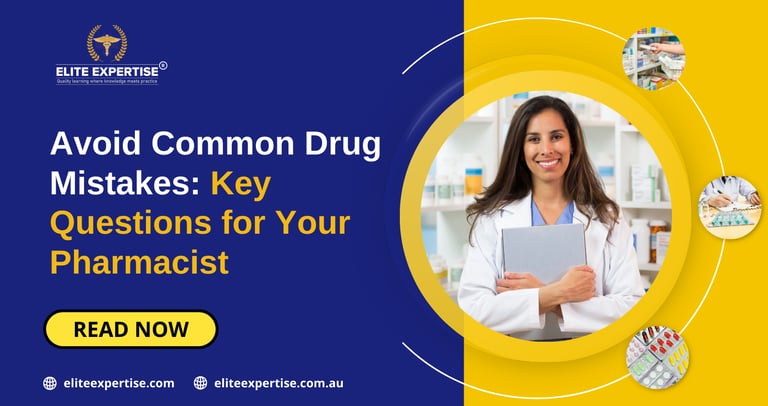ASK MY PHARMACIST | GOT QUESTIONS? Your pharmacist has answers. Click Here
Avoid Common Drug Mistakes: Key Questions for Your Pharmacist
Avoid drug mistakes and stay safe by knowing the right questions to ask a pharmacist about dosage, side effects, storage, and interactions.
Radhika
8/29/20255 min read


It can be confusing to ask the right questions to a pharmacist when you are unsure of a medication. In such cases, it is good to start with the basic information – what does this medicine do?
However, may leave the pharmacy without asking questions, which can jeopardize your health and well-being. Pharmacist are there to help and guide you, so it's essential to consider their direction.
To help you get started with this process, here are some questions to ask and the common mistakes people make about their medications.
Overview of Common Drug Mistakes
Taking your medications should be easy; you go to a pharmacy, ask your pharmacist for a medication, make the payment, and your job is done.
However, individuals can make mistakes, especially if they are not aware of the medication or are unsure of what to ask the pharmacist. Are you making them? Here is a list of what not to do at the pharmacy:
1. Not following the pharmacist's instructions: Your pharmacist is an accessible resource. Do not hesitate to ask them any questions you have about the medicine. It is also recommended to take your medication at the scheduled time as directed.
2. Not refilling prescriptions: If you have a condition, it is best to refill them before you run out of medication, or you may risk your health by missing a dose.
3. Getting your prescriptions from many pharmacies: It can be tempting to look for a cheaper alternative for medications. However, if you are sourcing it from a single location, a pharmacist may review your medication record and identify any potential drug interactions.
In this blog, we will explore what to ask a pharmacist and tips for effective communication.
Why You Should Ask Your Pharmacist Questions
Pharmacists are essential and the most accessible members of the healthcare system. Consulting them is an integral part of your healthcare journey and is critical.
They are well-informed on the safety of drug use, drug interactions, and effects on the body, as well as patient education. They also help keep a record of your medication use so that they can inform you about potential risks associated with any new medications.
Key Questions to Ask Your Pharmacist to Avoid Drug Mistakes
1. What is the correct dosage and timing for this medication?
Please read the label on your medicine; it should specify the dosage. Do confirm it with your pharmacist to ensure everything is clear. Some require a scheduled time, and missing them can cause health consequences. Follow the instructions as directed by him so that the medicines are effective and you can recover quickly.
2. Are there any possible side effects or interactions with my current medications?
A drug interaction happens when a drug interacts with another drug, food, or a drink. They can cause specific side effects, making medications less effective.
It is essential to ask your pharmacist how a drug interacts. If you are taking multiple medications, it is especially wise to ask a pharmacist beforehand to prevent potential risks. A pharmacist will provide the proper schedules, solutions, or alternatives to reduce any adverse reactions from medications.
You can also carry a pill case or schedule your dosage on mobile, so even if you forget, your phone won't.
3. How should I store this medication properly?
Storing accurately prolongs a medication's effectiveness. Some medicines need to be kept at room temperature, while others require storage in a dry, dark place, away from sunlight. Travelling with medicines also requires special care, especially when crossing time zones and the weather is unsuitable for those conditions.
Some medicines, like antibiotics, can be kept away from sunlight; however, certain medications, such as insulin, require refrigeration. Also, check their expiration dates regularly. Storing them correctly ensures that the chemicals and components do not break down and maintain their effectiveness for a longer time.
4. What should I do if I miss a dose?
Life happens; it is possible to miss a dose. However, with severe conditions, medications are time-sensitive.
Dosing for some medications is more time-sensitive than for others. You should know what to do if you accidentally skip a scheduled dose of your medication. In some cases, our pharmacist may suggest taking the missed dose when you remember or taking it at the next scheduled time. With other medications, they may recommend doubling the next dose. Knowing what to do will ensure the most effective outcome.
(Tip: If you are on multiple medications, learn more about MediBubble®, our medication management service that streamlines the process so you don't miss doses.)
5. Are there any foods, drinks, or activities I should avoid while taking this medicine?
Each medicine will react differently, especially if you are taking other medications or drinks. If your pharmacist has instructed you to take medication on an empty stomach, you should follow this instruction. If directed to take it after breakfast or lunch, please follow the instructions.
Certain things should be avoided entirely, such as drinking medicines with alcohol, even if it is in small amounts. If you drink, there can be short-term or long-term effects affecting your ability to do routine tasks. It is best to ask a physician or a pharmacist about possible interactions and effects with foods or drinks.
6. How long should I continue this medication?
If you are suffering from a cold or fever, the duration might be short. For certain primary conditions, medications may need to be taken for an extended period. For some, it may be necessary to take it as needed, while others require a strict schedule and use it until the entire supply is depleted. It is essential to know this before taking any medication.
7. Are generic versions safe and effective compared to brand-name drugs?
Medications can be expensive, and some individuals may struggle to cover the costs entirely. If you feel that the price is too high, your pharmacist can help you.
Alternatives, safer, and lower-cost options might be available for identical medications. You can switch to generic medications unless your physician directs you otherwise.
Some pharmacies also provide discount programs or patient assistance. These are available to people with low incomes who can get their medicines at a lower cost. Affordability and healthier living are everyone's right, so do not hesitate to ask your pharmacist for help.
Australia offers a Medicare card, allowing people to access healthcare services, doctors, specialists, and medicines at no cost or at a reduced cost under the Pharmaceutical Benefits Scheme (PBS).
Tips for Effective Communication with Your Pharmacist
Communicate effectively, do not feel embarrassed, and do not forget to ask questions to the pharmacist. Remember, your health is the priority, and pharmacists offer the proper guidance in this recovery. Be an active listener, ask specific questions, and do not hesitate, so that you can leave the pharmacy with a clear understanding. Here are some tips:
Know Your Medications
Think about your medication beforehand
Listen attentively and ask questions if confused
List what is directed by the pharmacist again
Make sure to mention health history and changes experienced
Ask about alternatives
Follow up, and if you feel uncomfortable with the medicine, report the changes
Also Read: Best 15 Pharmacy Courses to Boost Your Career in 2025
Conclusion
Your local pharmacist is a healthcare resource that you can easily access for good health and safety.
They are the ones who are prepared to offer you professional guidance in your medications and medication regimen, from identifying side effects to avoiding dangerous drug interactions.
So, don't be afraid or embarrassed; ask questions that will give you clarity so that you can take your medicines without worry.


About the Author
Radhika
Content Writer | Elite Expertise
Radhika loves all things content! With a Master's in English Literature and over 4 years of experience in digital strategies. She specializes in creating engaging content across diverse industries - including healthcare, technology, and e-commerce - always writing content that connects to its readers.
Follow On
Follow Us
+91 76750 84909
Privacy Policy | © 2025 Elite Expertise . All Rights Reserved.
ELITE EXPERTISE PTY. LTD (ABN: 15668292439) (ACN: 668292439)
Australian Statutory Education License: OPP 2025 ELITE EXPERTISE PTY. LTD
Disclaimer
Elite Expertise is an online education platform dedicated solely to providing coaching and preparation services for the OPRA, PEBC, PSI and PTE exams. We do not offer any sponsorship or migration services. All information provided on our platform is for educational purposes only and should not be interpreted as legal or immigration advice. For inquiries regarding sponsorship, visa applications, or migration services, please consult with licensed immigration professionals or relevant authorities.
Elite Expertise is a trusted and results-driven training platform specializing in preparation for international pharmacist licensing exams. Our comprehensive courses, expert instructors, and proven methodologies have helped countless pharmacy professionals achieve their goals and succeed in competitive regulatory exams. We are proud of our strong success rate and commitment to excellence.
Elite Expertise is an independent training provider. We are not affiliated with any global pharmacy regulatory authorities or official exam-conducting bodies.
Copyright © 2026 Elite Expertise. All rights reserved.
Address
Unit 1/73 Beverley St, Doncaster East VIC 3109, Australia
